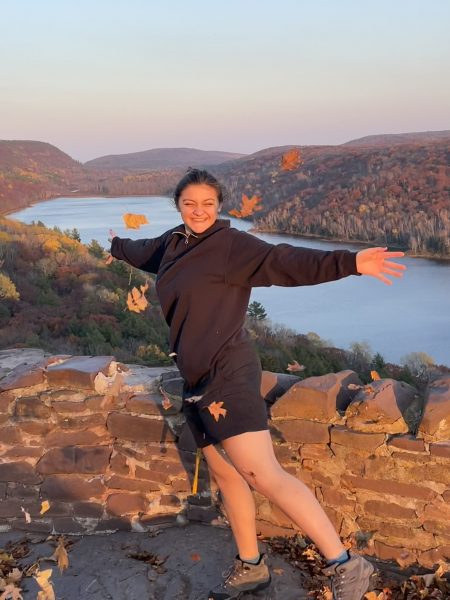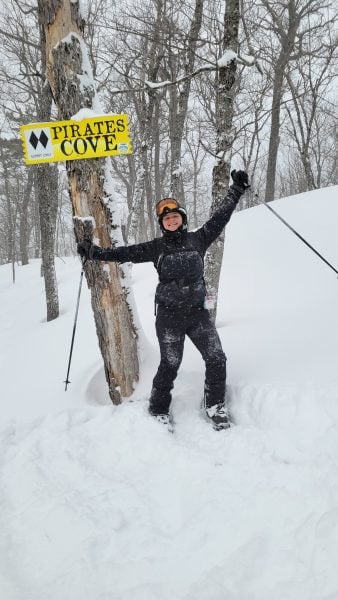
Deciding on a major can sometimes be a confusing and circuitous path. Junior Emily Taylor describes how she ultimately committed to her degree programs, while reflecting on her personal and professional journeys at Tech and tracing her academic history all the way back to middle school.
A Math Problem
Emily Taylor is double-majoring in biological sciences and computational biology, with minors in computer science and mathematics, yet she jokes she wasn’t great at math in high school. I lean in to her comment. As a person who truly was bad at math in high school (I read Stephen King novels in Algebra II class while quietly failing it) I’m intrigued. On her LinkedIn profile Taylor states, “Through middle and high school, my education was haunted by long nights at my desk staring blindly at algebraic equations that made absolutely no sense. I was constantly plagued with hard drive errors, system crashes, and the Blue Screen of Death from my school loaner laptop. It seemed as if everything pointed towards the notion that mathematics and computing were NOT for me. Then, in my senior year of high school, I took my first computer science class. Everything clicked.”
Taylor’s revelation about the intersection of math, computer science, and biology further solidified when she came to Michigan Tech. With a plan to major in biological sciences, she was disappointed when she realized this degree might restrict her newfound interests in math and computing. But then she discovered bioinformatics, which Taylor describes as a “conglomerate of data science, computational thinking skills, coding, biology, and biochemistry.” Taylor says she is enthralled by the flow between math and biology, noticing that “biology needs a stronger background in statistics, data analysis, and computer skills.” Bioinformatics and computational biology, she asserts, may be the response to that need. “Michigan Tech has a great computing program with many varied research opportunities in the bio field,” she says, “so Tech checked many boxes for my degree program needs.”
Tech Helps Students Find Answers
Taylor sits across from me at my desk for our interview. She is an earnest student, donning a windbreaker emblazoned with the Alpha Sigma Tau insignia. I ask her about Greek Life before we dive into the deeper and dicey-er realms of computational biology, bioinformatics, and genomes. (All terminologies she will soon explain to this “non-math” person with the clarity of a science writer and the patience of a Kindergarten teacher.) Her passions, however, are clearly not restricted to academics: she lights up as she describes her sorority experience. Emily joined Alpha Sigma Tau as a sophomore. She said it was one of the best decisions she made at Tech. Through her membership she has made great friends, learned networking skills, and been offered leadership opportunities, as she is currently the Director of Academic Success for Alpha Sigma Tau and the Technology Lead for the MTU Rowing Club’s executive board. Since only 10% of Tech students take part in Greek Life, Taylor encourages more Tech students to join. When asked what students’ reluctance may be, she speculates that perhaps a fear of hazing or the typical stereotypes deter them. However, she maintains that it’s “such a supportive environment and a great way to make long-lasting relationships.” After learning how to ski on Mont Ripley in her freshman year, she and some of her friends (sorority sisters themselves) traveled to Quebec to go skiing. It was Taylor’s first time abroad, and yet another personal growth experience as she learned how to navigate and communicate in a Francophone province.
So, why Tech? Taylor ultimately comes to Tech from Washington state, but her father is a Tech alum. Upon high school graduation, her family moved to Wisconsin during the upheaval of COVID, so she applied to colleges both in the Midwest and West. But after seriously considering the University of Wisconsin–Madison and the University of Washington, Taylor committed to Tech. The deciding factor? Funding. Tech offered her the most scholarships, and she has never looked back on her decision. Taylor lights up again as she describes what she loves about Tech. Broomball. Winter Carnival. The Keweenaw. She loves how broomball can be an “all or nothing” experience. With so many different leagues and levels, she said you can play as much or as little as you want. And in learning how to build snow statues, she said she has “learned to embrace the winter and use the snow as a medium for fun.” As a serious student, she loves Tech’s “work-hard, play-hard culture.”
And Taylor loves that Tech is hard. But she also says that while “Tech is academically challenging . . . anybody (students, professors, learning centers, and other faculty) is willing to help out and ensure that each student is performing to the best of their ability.” In addition to Greek Life, Taylor credits Pavlis Honors College for helping her grow as a young professional. She says the College has taught her how to “curate her career to align with her values and long-term interests” and that their seminars foster reflection, professional development, and ultimately, help students answer the question: “What’s your story?” This level of self-inquiry led Taylor to realize that her passion for biology “stood somewhere different than [her] peers.” She said that in realizing she truly enjoyed computer science, math, and statistics, she decided to add the second major in computational biology. But what exactly is computational biology? Or bioinformatics? Or a genome for that matter?
A Biological Question
Taylor sits up and leans forward as she starts to answer my questions. She looks up at the ceiling for a moment as she formulates her answer. She realizes she’s speaking to a layperson (again, someone who is probably bad at biology too) so she chooses her words carefully as she considers her audience. She explains that a genome is the complete set of genes in an organism. She references the Human Genome Project—an international research project that began in the 90s in an attempt to identify and map all of the genes in the human genome—as she provides greater context for her studies and research. She speaks of the importance of this research as it relates to the DREAM complex, “a group of important proteins that are expressed within cells that help to control the cell cycle. In other words, the DREAM complex plays a key role in development and growth.”
Taylor is currently doing computational biology and evolutionary genomics research for Dr. Paul Goetsch. She describes her research as “gathering data on the varying number of mutations that exist within the DREAM complex’s genetic code across a wide variety of species.” This allows her to “learn how the DREAM complex’s genes have changed over the course of evolution, from species to species.” She says there isn’t a lot of research about the evolution of the proteins, and the way they appear to change throughout species is inconsistent with what the scientific community usually observes with highly essential proteins. Bioinformatics (the implementation of software engineering and computational tools to biology) coupled with computational biology (the use of statistics and data analysis to interpret massive sets of biological data) allows researchers like Taylor to develop pipelines to identify and learn how genes change as they evolve. This research is valuable because the development of these bioinformatic pipelines and tools can be used to study development and cancer.
Taylor hopes to one day go into Proteomics or develop algorithms to help generate even more biological questions. She thinks her addition of computational biology as a major will allow her to offer an interdisciplinary approach to potential employers. She recommends a computational biology major to anyone who enjoys math, computer science, and biology. She says, “You could end up researching cancer biology, developing new DNA sequencing and annotation algorithms, or mining the rapid influx of biological data.” She distills these endless possibilities into a simple “math” problem: “Think of a biological question you want to answer and see if you can figure it out by playing with data!”
Even though Taylor only started her computational biology program studies this past summer, she says she has adopted the values of learning deeply and being open to challenges. “This research is hard,” she says, “especially when you’re doing something completely new to the scientific community and need to apply the most advanced concepts you’ve learned in the lecture hall.” And Taylor has also learned that failure is part of that process. She says she affords herself the space and “time to go down an unforeseen rabbit hole.” It’s all part of the adventure—in learning, in growing, in having fun–at Tech.
About the Biological Sciences Department
Biological scientists at Michigan Technological University help students apply academic concepts to real-world issues: improving healthcare, conserving biodiversity, advancing agriculture, and unlocking the secrets of evolution and genetics. The Biological Sciences Department offers seven undergraduate degrees and three graduate degrees. Supercharge your biology skills to meet the demands of a technology-driven society at a flagship public research university powered by science, technology, engineering, and math. Graduate with the theoretical knowledge and practical experience needed to solve real-world problems and succeed in academia, research, and tomorrow’s high-tech business landscape.
Questions? Contact us at biology@mtu.edu. Follow us on Facebook and Instagram for the latest happenings.

